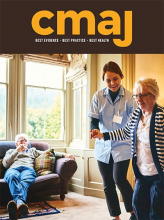More than 800 doctors and other health care providers are pushing back against Ontario’s freeze on overdose prevention sites, joining more than 100 health and advocacy groups in protesting the policy.
Doug Ford’s Progressive Conservative government announced in August it would pause planned openings and further approvals of overdose prevention sites while reviewing the merits of the facilities.
In an open letter, health providers urged the government to rethink the “potentially fatal” freeze, given the mounting numbers of overdose deaths in the province. “Evidence unequivocally demonstrates that supervised consumption services save lives and keep communities safe,” the letter explained. “Delaying the opening of these sites will contribute to unnecessary illness and death.”
More than 1000 people died from opioid overdoses in Ontario last year, and still more are expected to die this year without emergency intervention, said Dr. Nanky Rai, a Toronto family physician and cosignatory of the letter.
The government announced the pause just days before an overdose prevention site was slated to open in Toronto’s Park-dale community, which had seen seven overdose deaths in the previous two weeks.
“It’s morally bankrupt to go through this process when they can easily review the evidence while continuing to open sites that already have staff hired, and are stocked and ready to go,” Rai said.
The open letter calls on the government to allow three sites that were previously approved to open. Health providers are also urging the government to approve applications for new sites, expand funding for overdose prevention and work with people at the frontlines of the crisis to develop additional strategies to curb overdose deaths.

Health providers warn that Ontario’s freeze on overdose prevention sites is “negligent and inhumane” given mounting deaths.
Image courtesy of Katie Dorman
It’s the second open letter from health workers protesting the freeze. Last week, 120 health and advocacy groups, including the Canadian Medical Association, called on the government to rapidly scale up overdose prevention services.
Both letters emphasized the weight of evidence showing that overdose prevention sites improve public health and safety. Data from Insite, North America’s first sanctioned supervised consumption site in Vancouver, show that the rate of fatal overdoses in the city’s downtown eastside decreased by 35% after the site opened. Other studies show that supervised consumption sites reduce the spread of HIV and hepatitis C, increase access to primary care, and reduce both public drug use and the number of discarded needles in communities. Moreover, the sites do not contribute to increased violence or crime.
Despite accumulated evidence and health provider protests, the government has signalled it will continue to delay approved sites from opening while it conducts further review.
“It’s really distressing to see the government responding in the way it has,” said Dr. Michaela Beder, another cosignatory of the most recent letter. “We need to be making evidence-based decisions if we’re talking about people’s health.”
Footnotes
Posted on cmajnews.com on Sept. 5, 2018.











